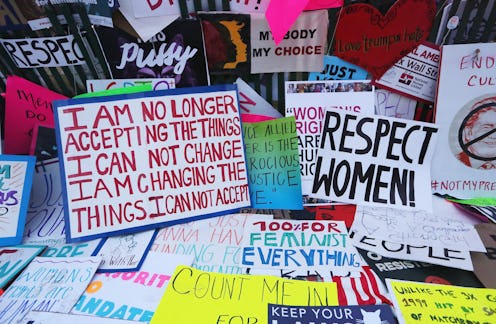
On Wednesday, the House Subcommittee on the Constitution and Civil Justice will hold a hearing on the "Heartbeat Protection Act of 2017," otherwise known as H.R. 490. If enacted, the bill would ban all all abortions after a fetus has a detectable "heartbeat," which usually occurs at around 6 weeks gestation, and would imprison doctors for up to five years if they perform an abortion after that time. The heartbeat bill absolutely betrays women because it puts their wellbeing at risk as well as limits their reproductive agency, with the apparent goal of ultimately overturning Roe v. Wade.
H.R. 490, which was introduced by Rep. Steve King, bans abortions after a fetal heartbeat is detected, though as Slate reported, the term "heartbeat" is not necessarily accurate. What the bill refers to as a heartbeat is actually a motion in the fetal pole, the thickened side of an embryo’s yolk sac. That motion is known as “fetal pole cardiac activity" — something which has little resemblance to a human heart and is considered an early "structure," not a human organ.
The bill bans all abortions after this fetal pole cardiac activity is detected —usually at six weeks of pregnancy — and makes no exceptions for rape, incest, or the psychological health of the mother. It only allows for exceptions if the mother's physical health is in danger.
This bill is an affront to women for many reasons. First and foremost, it constitutes a deliberate — and unconstitutional — attempt to limit women's reproductive rights and agency. Banning abortions so early in the pregnancy substantially limits a woman's choice to have an abortion, given how often women don't even realize they are pregnant until six weeks or later. If this bill became law, many women would be forced into continuing their pregnancy if they discovered it after the six-week mark.
Moreover, as Slate noted, the heartbeat bill is very clearly unconstitutional, as Roe v. Wade mandates that women be permitted to have abortions before fetal viability, which usually occurs at around 24 weeks of pregnancy. Back in January, The Guardian reported that Rep. King suggested a heartbeat bill could be a step towards overturning the landmark Supreme Court decision — which in turn would would massively undermine women's reproductive rights.
What's more, the heartbeat bill puts women's lives and wellbeing at risk. As the Huffington Post reported, limiting women's access to abortion does not decrease abortions — it simply pushes women to seek unsafe abortions, including through ingesting dangerous substances to induce an abortion, self-inflicted "bodily trauma," or looking to untrained providers to perform abortion services.
Unsafe abortions can result in serious injuries to women, and even death. Indeed, according to the World Health Organization (WHO), 47,000 women die from complications of unsafe abortion each year, most frequently in developing countries where abortion services are not accessible. If the heartbeat bill became law, that number could substantially increase with many American women dying from unsafe abortions.
In addition to putting women's lives and physical health in danger, it also gives no consideration to women's mental health. The bill does not allow for exceptions to the abortion ban for for "psychological or emotional conditions.” A woman would be barred from having a safe and legal abortion after six weeks even if continuing the pregnancy would put her psychological health at stake. This reflects a clear affront to women's health and a lack of respect for the gravity of mental health issues.
It seems unlikely that the heartbeat bill will actually become law; even if it passes the House of Representatives, it would have difficulty getting a filibuster-proof 60 votes in the Senate. That being said, the fact that the heartbeat bill exists in the first place — and that lawmakers are holding a hearing to discuss it — is a complete affront to women and a betrayal of women's place in society as equals.